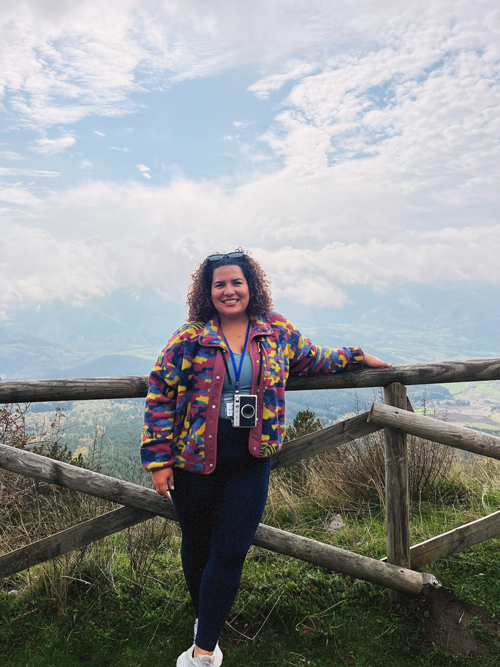10 February 2025—Wilnelly Ventura-Valentín’s research as a Ph.D. student at Miami University in Ohio focuses on earthquake swarms, the bursts of seismic activity—small earthquakes all about the same magnitude—that start abruptly and end abruptly.
“We don’t know a lot about what triggers this activity,” she explains, “and because we don’t know the driving force, it makes it very difficult for us to predict how long they will last, and to produce the same kinds of earthquake products for the public that we have for mainshocks and aftershocks.”
 Manually identifying these swarms in an earthquake catalog is time consuming and can be biased depending on what each researcher considers to be a swarm. Ventura-Valentín’s thesis project “was to find a way of objectively looking at swarms in a catalog, using a code based on five characteristics of defining a swarm and mainshocks and aftershocks,” she says. “My tool is a way of creating swarm catalogs more accessible so that we can further study them.”
Manually identifying these swarms in an earthquake catalog is time consuming and can be biased depending on what each researcher considers to be a swarm. Ventura-Valentín’s thesis project “was to find a way of objectively looking at swarms in a catalog, using a code based on five characteristics of defining a swarm and mainshocks and aftershocks,” she says. “My tool is a way of creating swarm catalogs more accessible so that we can further study them.”
Ventura-Valentín’s tests of the tool with earthquakes in Mexico show that it works well. She received a 2024 SSA Annual Meeting Student Presentation Award for her presentation on automated detection and characterization of swarms and mainshock-aftershock sequences in southern Mexico. Others in her lab are now applying the tool to other Central American countries, she notes, and may use it to analyze the Alaskan subduction zone earthquakes in the future.
“The more swarms we can find, the more information we will have, and we can get closer to knowing what drives them, whether it’s fluid migrating or slow slip, or probably these two working together,” she says.
Ventura-Valentín had no prior coding experience before graduate school, but she learned how to build her algorithm in part with the help of a seismology skill building workshop created by her advisor Mike Brudzinski, she says. “I was kind of like the guinea pig” for the early days of testing the workshop modules, she recalls. The free online workshop is now offered in the summer by EarthScope Consortium.
In the last stages of her degree—she will graduate in the summer of 2025—Ventura-Valentín has a few ways that she keeps herself going through the “Ph.D. limbo,” as she describes it.
“I try to use conferences as my personal deadlines, to push me to get things out to present,” she says.
Ventura-Valentín also has a deep interest in community building and breaking down barriers to encourage more Latinx researchers in the earth sciences. As part of the Unlearning Racism in Geoscience (URGE) group at Miami, she has worked on several projects such as an updated field safety code of conduct aimed at making field trips more inclusive and welcoming for students of different backgrounds. She received a 2024 Graduate Student Advocate Award from the university for her work.
Ventura-Valentín is also a co-leading member of GeoComunidad, a Latinx affinity group with the goal to foster a sense of belonging and increase retention among underrepresented groups in the geosciences. GeoComunidad started as an affinity group at the Geological Society of America annual meetings creating opportunities for Spanish-speaking participants to connect in their native language.
“It’s hard to go into a field where you don’t know anyone or see anyone who looks like you,” Ventura-Valentín says. “In my family, there’s no seismologists, so it was a big deal to go for this field. It’s important to me to have ways that I can say, ‘here I am, reach out to me, a familiar face.’”
Growing up in Puerto Rico, Ventura-Valentín’s early scientific interest was in hurricanes. “Whenever the power went out, we would listen to the radio, the updates, and I remember just thinking, how do they know where it’s going?” she says. “I had all of these questions, so I thought I was going to be a meteorologist when I went to college.”
At the University of Puerto Rico at Mayagüez, Ventura-Valentín had to take geology to get into the meteorology minor. And the Puerto Rico Seismic Network, connected to the geology department, was hiring students.
“I didn’t even know what the seismic network was, I was just like, I need money,” Ventura-Valentín jokes. “But I just fell in love with their work, their passion for understanding earthquake hazards and informing the public.”
She would like to return to Puerto Rico to “keep doing research on my island” and become a professor.
“I love research and I love education. I hadn’t thought about being a professor or teaching before I started grad school, but honestly I love it. I love coming up with ways to translate to very complex subjects into plain language,” she says.
SSA At Work is a monthly column that follows the careers of SSA members. For the full list of issues, head to our At Work page.
